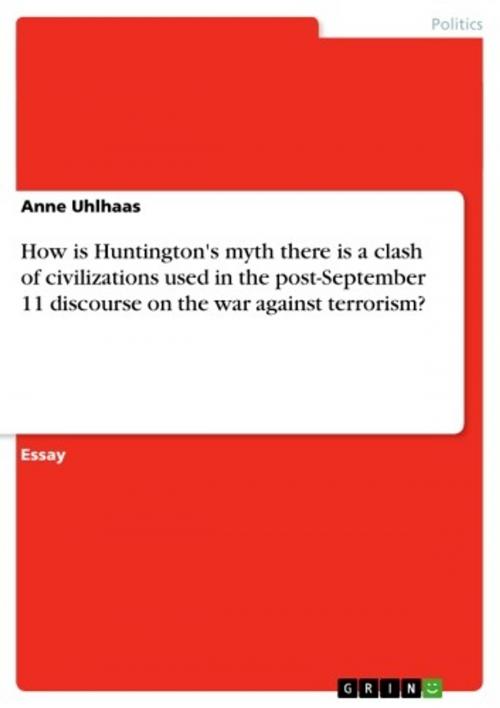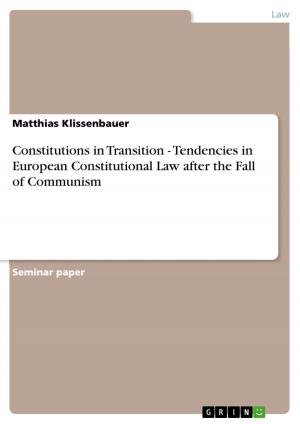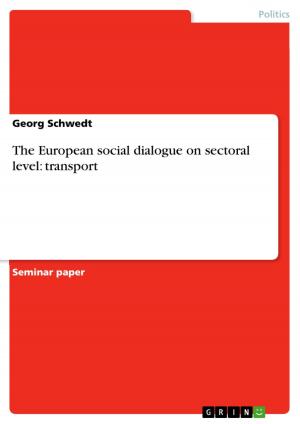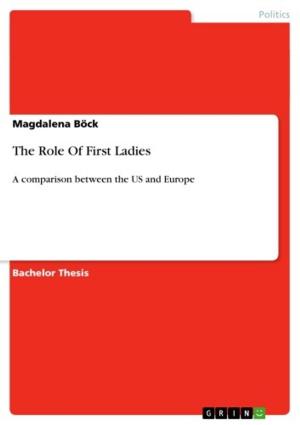How is Huntington's myth there is a clash of civilizations used in the post-September 11 discourse on the war against terrorism?
Nonfiction, Social & Cultural Studies, Political Science, International, International Security| Author: | Anne Uhlhaas | ISBN: | 9783638176620 |
| Publisher: | GRIN Publishing | Publication: | March 13, 2003 |
| Imprint: | GRIN Publishing | Language: | English |
| Author: | Anne Uhlhaas |
| ISBN: | 9783638176620 |
| Publisher: | GRIN Publishing |
| Publication: | March 13, 2003 |
| Imprint: | GRIN Publishing |
| Language: | English |
Essay from the year 2002 in the subject Politics - International Politics - Topic: Peace and Conflict Studies, Security, grade: ECTS-grade: B = 2, University of Leeds (Institute for Politics and International Studies), course: Popular Culture and International Relations, 13 entries in the bibliography, language: English, abstract: The posed question deals with the investigation of the use of Huntington's myth 'there is a clash of civilizations' in the discourses referring to the horrible events on September 11. Hence, several different questions have to be answered, as they are: How does Huntington himself link his myth to the 'war against terrorism'? Which parts of Huntington's myth are used in which way and by whom? Do the users of his myth support or neglect Huntington's original thoughts and do they exert their source deliberately or unconsciously? What do the users of Huntington's myth and Huntington himself fail to mention, which is necessary to let the theories function? And eventually, which theory after all is the one most fitting the facts? Answering the questions, I will argue that the myth is used over the whole discourse, concerning September 11. Interestingly, parts of Huntington's myth are both employed by proponents and opponents of Huntington, sometimes even without recognising it. Instead of speaking of different discourses, one should more precisely say that there is only one huge discourse with different outgrowths and directions. The various arguments are closely linked. Sometimes even opponents use Huntington as their basis in different ways. Therefore, none of the posed arguments - as Huntington's myth itself - can function and be persuasive on its own. It will be argued that, what causes the clash is not just difference - as Huntington suggests - but the vain attempt to create equality. This is the basis for all arguments with regard to September 11. However, if creating equality is the cause of the terrorist attack, it is neither the existence of different cultures, the powerful behaviour of the US nor the violent roots within the Muslim world which can account for the reason of the terrorist attacks. It is in fact the process of globalisation and the consequential disappearance of cultural power which causes the actual problem.
Essay from the year 2002 in the subject Politics - International Politics - Topic: Peace and Conflict Studies, Security, grade: ECTS-grade: B = 2, University of Leeds (Institute for Politics and International Studies), course: Popular Culture and International Relations, 13 entries in the bibliography, language: English, abstract: The posed question deals with the investigation of the use of Huntington's myth 'there is a clash of civilizations' in the discourses referring to the horrible events on September 11. Hence, several different questions have to be answered, as they are: How does Huntington himself link his myth to the 'war against terrorism'? Which parts of Huntington's myth are used in which way and by whom? Do the users of his myth support or neglect Huntington's original thoughts and do they exert their source deliberately or unconsciously? What do the users of Huntington's myth and Huntington himself fail to mention, which is necessary to let the theories function? And eventually, which theory after all is the one most fitting the facts? Answering the questions, I will argue that the myth is used over the whole discourse, concerning September 11. Interestingly, parts of Huntington's myth are both employed by proponents and opponents of Huntington, sometimes even without recognising it. Instead of speaking of different discourses, one should more precisely say that there is only one huge discourse with different outgrowths and directions. The various arguments are closely linked. Sometimes even opponents use Huntington as their basis in different ways. Therefore, none of the posed arguments - as Huntington's myth itself - can function and be persuasive on its own. It will be argued that, what causes the clash is not just difference - as Huntington suggests - but the vain attempt to create equality. This is the basis for all arguments with regard to September 11. However, if creating equality is the cause of the terrorist attack, it is neither the existence of different cultures, the powerful behaviour of the US nor the violent roots within the Muslim world which can account for the reason of the terrorist attacks. It is in fact the process of globalisation and the consequential disappearance of cultural power which causes the actual problem.















